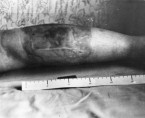Medical experiments
The participation of numerous German physicians in criminal medical experiments on concentration camp prisoners was a particularly drastic instance of the trampling of medical ethics. The initiators and facilitators of these experiments were Reichsführer SS Heinrich Himmler, together with SS-Obergruppenführer Ernst Grawitz, the chief physician of the SS and police, and SS-Standartenführer Wolfram Sievers, the secretary general of the Ahnenerbe (Ancestral Heritage) Association and director of the Waffen SS Military-Scientific Research Institute.
The SS-WVHA (SS Main Economic and Administrative Office, in charge of concentration camps from March 1942) had administrative and financial authority. Support in the form of specialized analytical studies came from the Waffen SS Hygiene Institute, directed by SS-Oberführer Joachim Mrugowsky, an M.D. and professor of bacteriology at the University of Berlin Medical School.
Experiments were planned at the highest levels to meet the needs of the army (some were intended to improve the state of soldiers’ health) or postwar plans (including population policy), or to reinforce the bases of racial ideology (including advancing views as to the superiority of the “Nordic race”). Aside from experiments planned at the highest levels, many Nazi doctors experimented on prisoners on behalf of German pharmaceutical companies or medical institutes. Others did so in pursuit of their personal interests, or to advance their academic careers.
During the Second World War, Nazi doctors pandered to the expectations of the Third Reich leadership by supporting the regime’s demographic policies. They initiated wide-ranging research on methods of mass sterilization that would be applied to peoples regarded as belonging to a lower category.
